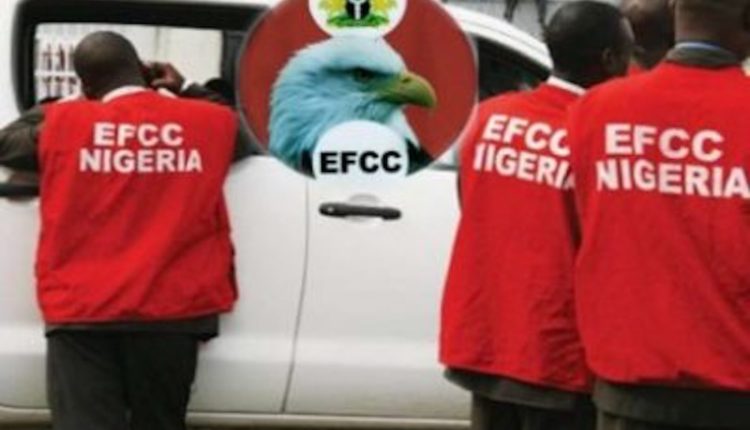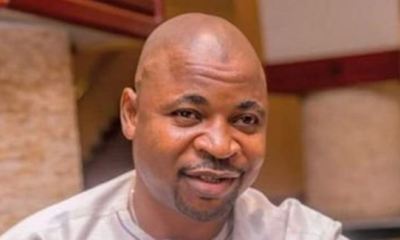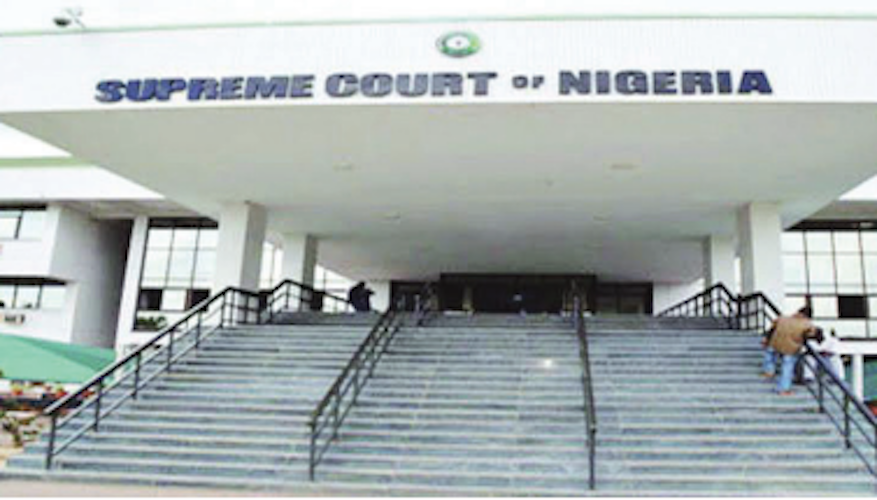Law
FEPFL urges FG to respect court judgement that sustains LG marriage registry

Foundation for Enhancement and Promotion of Family life (FEPFL) has urged the Federal Ministry of Interior to accept the court Judgment that empowers local governments to conduct marriage registry.
The Chief Executive Officer of FEPFL
John O. Amabi in a Statement made available to the National update on sunday observed that it will enable the country to squarely face the reality of the decayed human morals that is fueling violent extremism in the society.
A Federal high court sitting in Lagos, Presided over by Justice D. E. Osiagor had ruled that only the local government marriage registries were empowered by the 1999 constitution (as amended).
This judgment Amabi said is timely as it will enable the Nigeria states in the Federation to quickly domesticate the National matrimonial act, by prompting the 36 State Assemblies to make laws that will build their culture and religion into the state matrimonial laws.
According to him, “A careful study of the National Matrimonial Act shows that it is alien to Nigeria setting: The act that governs how human beings are produced in the Nation is made for just a section of the country.
“FEPFL Keep on saying that matrimonial law is for the child moral wellbeing as NAFDAC is for the physical wellbeing of the Nation. “There is no Nation in the world that have alternative to marriage in terms of human procreation and moral upbringing. The child’s moral education is the primary assignment of couples in any peaceful marriage and home.
“A morally healthy society is a product of peaceful marriages. We are faced with the issue of children being involved in crimes, drugs, rape, armed robbery and cultism.
“These trigger untimely death of children in different parts of Nigeria, because the children are not taught morals from homes at the right time.
“The autonomy of Local governments should start by allowing the local Government Authorities carryout their mandates, rather than the bullying attitude of the Federal and State Governments whereby all their resources and revenue generation potentials are being usurped.”
This the CEO observed is among the reasons there is less activities at Local Government Areas in Nigeria.
“Foundation for Enhancement and Promotion of Family Life, is using this opportunity to appeal to the Honourable Minister of Interior and his team for the sake of the future of the unborn Nigerian children, to accept the court Judgment and champion the movement for domesticating the Nigeria matrimonial act to enable states create laws that will enhance the activities of the Local Governments as it relates to marriage registry.
“The laws that will empower parents with the responsibilities of child moral education in the first six years of the child’s live.
“As research had shown that a child with good moral upbringing often performs better in school, with less records of crimes who will turnout to be good citizen and pride of the Nation.”
“This is a good step to rebuilding our human morals as a Black Nation, and curb the issues of children in violent extremism in communities as results of marriage and family system failures.
Such failures in the first instance he said are due to the wrong process by which couples contract marriages leading to neglect of the core values of our lives, which is our culture and religion.
Law
EFCC Grants Bail to Two Kogi Officials, wants Yahaya Bello’s Fraud Case adjurned

The Economic and Financial Crimes Commission (EFCC) has granted administrative bail to two co-defendants, Umar Oricha and Abdulsalami Hudu, in a fraud case involving former Kogi State Governor, Yahaya Bello. The case, centered on charges of fraud totaling N101.4 billion, has been adjourned until November 27, 2024, by the Federal High Court in Abuja.
At the hearing before Justice Maryann Anenih, EFCC Counsel Jamiu Agoro requested an adjournment, noting that the 30-day compliance period for Bello’s summons, issued on October 3, had not yet expired. Agoro explained that the November 20 court date was inconvenient for the prosecution, and that seeking an arrest warrant would be premature as Bello still had a few days to respond to the summons.
Both the second and third defendants’ legal representatives supported the adjournment request.
Following this, Justice Anenih approved the EFCC’s request, extending the deadline for Bello’s appearance and authorizing service of the hearing notice to be sent to his last known address.
In a parallel development, the Federal Capital Territory (FCT) High Court in Maitama ordered a hearing notice to be posted at Bello’s residence on Benghazi Street, Wuse Zone 4, Abuja, and on the court’s notice board.
This step follows multiple missed court appearances by Bello since the public summons was issued, urging him to appear for arraignment on 16 counts related to the alleged fraud.
Justice Anenih emphasized the importance of due process, setting November 27, 2024, as the final date for Bello’s court appearance. This case has drawn attention to the EFCC’s efforts to enforce accountability among high-profile figures in Nigeria amidst allegations of large-scale financial mismanagement.
Law
Appeal Court Sacks MC Oluomo as NURTW National President, Reaffirms Baruwa’s Leadership

In a significant development, the Court of Appeal has annulled the appointment of Musiliu Akinsanya, popularly known as MC Oluomo, as the National President of the National Union of Road Transport Workers (NURTW).
The ruling upheld a previous ruling by the National Industrial Court, which had already recognized Tajudeen Baruwa as the rightful leader of the union.
The legal dispute surrounding the NURTW’s leadership has been ongoing, with tensions escalating within the organization.
Despite the court’s ruling in favor of Baruwa, MC Oluomo was recently elected by the Southwest Zone of the union during the Quadrennial Delegate Conference held last week in Osogbo, Osun State.
This election took place amid growing concerns and disputes within the union’s regional factions.
The Appeal Court’s decision is expected to settle the leadership question, restoring Tajudeen Baruwa’s position as the legitimate National President of the NURTW.
However, the union faces potential challenges in maintaining unity across its various regional branches, as supporters of MC Oluomo continue to advocate for his leadership.
This ruling marks a pivotal moment for the NURTW, as it works to stabilize its governance and address internal divisions that have led to several controversies and disputes over recent years.
Law
Supreme Court Rejects States’ Legal Challenge to EFCC’s Constitutionality

The Supreme Court of Nigeria has thrown out a lawsuit brought by several state Attorneys General challenging the constitutional validity of the Economic and Financial Crimes Commission (EFCC). The case, led by Kogi State, questioned the EFCC Act, arguing that it bypassed constitutional requirements regarding international treaties.
The seven-member panel, headed by Justice Uwani Abba-Aji, ruled unanimously to reject the lawsuit, deeming it without merit. Kogi State’s counsel, Mohammed Abdulwahab, SAN, argued that the EFCC Act’s incorporation of the United Nations Convention Against Corruption was unconstitutional, as the law had not received approval from a majority of state Houses of Assembly, as required by Section 12 of the 1999 Constitution. This, he claimed, invalidated the EFCC Act and similar anti-corruption laws.
The plaintiffs also contended that the EFCC and NFIU lacked the authority to investigate state or local government funds, accusing the agencies of encroaching on state powers. Abdulwahab sought a court ruling to nullify the creation of these agencies, arguing it would prevent a potential constitutional crisis.
Attorney General of the Federation, Lateef Fagbemi, SAN, defended the EFCC, asserting that dismantling Nigeria’s anti-corruption agencies would harm the nation’s efforts to combat financial crimes. He argued that the National Assembly has the authority to create laws applicable nationwide to address corruption.
The court ultimately upheld the EFCC Act, ruling that the National Assembly’s legislative powers on corruption are valid and enforceable across all states. Justice Abba-Aji noted that Kogi’s revelations about state officials being investigated exposed ulterior motives behind the lawsuit, describing it as an attempt to shield certain officials.
“No state has the right to enact laws that contradict the statutes passed by the National Assembly,” Justice Abba-Aji said, delivering the judgment. The court dismissed the suit in its entirety, reaffirming that the EFCC Act and other federal anti-corruption laws remain constitutional and enforceable across Nigeria.
-

 Crime1 year ago
Crime1 year agoPolice nabs Killer of Varsity Lecturer in Niger
-

 News10 months ago
News10 months agoFCT-IRS tells socialite Aisha Achimugu not to forget to file her annual returns
-

 Appointment1 year ago
Appointment1 year agoTinubu names El-Rufai, Tope Fasua, others in New appointments
-

 News From Kogi1 year ago
News From Kogi1 year agoINEC cancells election in 67 polling units in Ogori-Magongo in Kogi
-

 News From Kogi1 year ago
News From Kogi1 year agoEchocho Challenges Tribunal Judgment ordering rerun in 94 polling units
-

 News1 year ago
News1 year agoIPOB: Simon Ekpa gives reason for seperatists clamour for Biafra
-

 Metro8 months ago
Metro8 months ago‘Listing Simon Ekpa among wanted persons by Nigeria military is rascality, intimidation’
-

 News10 months ago
News10 months agoKingmakers of Igu/ Koton-Karfe dare Bello, urge him to reverse deposition of Ohimege-Igu
